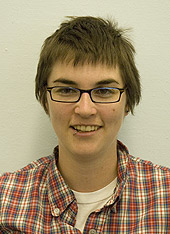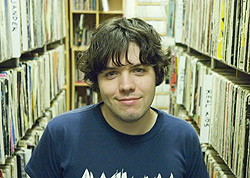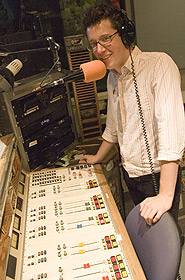Berkeleyan
For fans of adventurous radio, KALX delivers the unexpected
From hip hop and electronica to Indian ragas, the mighty 90.7 serves up a rich musical mélange
![]()
| 20 September 2006
To hear her tell it, Kendra Levine left her native Sacramento in 2000 to "come to KALX" - and also to attend Berkeley. Levine, an avid online listener to the campus radio station before arriving in town, balanced classes and broadcasting during her undergrad years, and has kept within striking distance of KALX since graduation. Now employed as a circulation manager at the Harmer E. Davis Transportation Library on campus, Levine has volunteered at the station for six years, first as a producer on "KALX Live!," the station's live-music showcase, and currently as co-director of DJ training.
 Kendra Levine (Wendy Edelstein photo) |
At KALX, Levine has learned music and radio production, also serving as an engineer for bands that play live in the studios. In addition to mastering the technical nuts and bolts, she says, she's discovered "how to deal with people." When she became the director of KALX Live!, Levine recalls, she was "young and snotty, as every 19- or 20-year-old kid should be." Older volunteers young enough to recall their own youthful self-absorption mentored Levine, teaching her "how to be more diplomatic."
Now 24, Levine leads DJ-training classes and reviews fledgling DJs' initial forays on the air. Beyond listening for the requisite number of public-service announcements, examples of solid engineering, and the airing of station and song IDs during mic breaks, Levine tracks whether new DJs are having fun. "It's weird how you can listen to a show and hear when a DJ starts playing music they don't care about," she says. "I'd rather hear a DJ play a song six times over and somehow impart their enthusiasm for that song than to play songs that are charting that they don't have any enthusiasm for."
Levine's own musical horizons have grown a lot during her time at KALX. When she first joined the station, she lived and breathed '60s garage music: the Hi-Fives, the Who, the Kinks. Now she's added hardcore and guitar-oriented garage-punk rock to the mix as well as reggae and Indian ragas. Most surprising, she's developed a love for old-time country music, including Willie Nelson, Tommy Collins, and Hank Snow, some of the musicians her grandfather still enjoys. She advises DJs-in-training to play what they like. "You're more entertaining to listeners when you're actually enjoying yourself rather than going through the motions."
That philosophy has made KALX a home for the kind of sonic eclecticism that is increasingly difficult to find on the corporate airwaves. Savvy listeners from Petaluma to Fremont set their radio dials to 90.7 FM to hear freeform music programming that's always reliably unpredictable. Fans of the campus station know they'll be exposed to new artists well before their music becomes part of the pop-culture zeitgeist. They'll also be treated to a jambalaya of music not found on any commercial-music radio station. (Recently, DJ Cookie Costello programmed a typically adventurous sequence: "Arctic Clouds," from violinist Owen Pallett's group, Final Fantasy; a bossa-nova tune, "Here's That Rainy Day," from tenor-sax legend Stan Getz; "Born on a Train," from Magnetic Fields, indie-pop songwriter Stephin Merrit's best-known band; and "Burning Down the House," by the seminal art-rock band Talking Heads.)
 "Disco" Shawn Reynaldo (Wendy Edelstein photo) |
Operations manager Shawn Reynaldo says KALX "provides a place to hear music you can't hear anywhere else - especially the mix of music you can't hear anywhere else." College stations like KALX have a freedom that is largely absent at commercial music stations - they're beholden neither to major record labels (and their media-conglomerate owners) nor to advertisers. A trip back through college-station playlists would yield lessons in prescience: Bands such as REM, Nirvana, and Green Day would never have broken into the mainstream without first getting airplay on KALX and stations of its ilk.
Radio, radio
KALX has only two paid administrative employees, including Sandra Wasson, its general manager since 1988. It relies heavily on the work of volunteers to act as DJs, produce its news segments and public-affairs programming, announce Cal Bears football and basketball games, and maintain its voluminous music library.
Although KALX is a college station, at least 30 percent of its volunteers come from the local community. Those community volunteers are "very valuable," says Wasson. "They provide continuity. Lots of stations go off-air or aren't able to broadcast 24/7." By offering a unique means for Berkeley students and community members to work together, Wasson says that KALX "is one way the campus cultivates a positive town-and-gown relationship."
From the vantage point of the independent-music labels whose artists are a mainstay of its airwaves, KALX "is a great station, because it does what college stations should do," says Susan Busch, who handles radio promotion for Sub Pop Records, the home of Saint Etienne, Beat Happening, Combustible Edison, and Postal Service. "KALX supports independent music, and its staff members play what they have a true passion for. That spirit is what college radio is all about."
Lisa Fancher, owner of Frontier Records, a Southern California label that's released recordings by Thin White Rope, Young Fresh Fellows, and Dharma Bums over its 26-year history, expands on Busch's sentiments: "In those early days of indie-rock labels, when we produced the goods but had no idea how to make a noise, our compasses would have continued to spin wildly had they not pointed north to KALX. Over the years, KALX's ceaseless support led to my bands booking Bay Area gigs, which led to press, which led to - omigod - national sales, all the while managing to filter out the squealing of moneyed major-label reps for indies. It was like a miracle..." She corrects herself, "It is a miracle!"
Sound salvation
 Tyler McCauley (Deborah Stalford photo) |
Tyler McCauley was one of Kendra Levine's early trainees. As a high-school student in Aptos, McCauley liked researching music online and considered himself "kind of nerdly." Like Levine, McCauley listened to college radio when he was in high school and signed up with KALX as soon as he arrived on campus, in 2004.
At a college radio station, "everybody starts at the bottom," explains McCauley, who began volunteering by opening the music department's mail and answering phones. Soon he was reviewing CDs with an eye to logging enough hours to enter DJ training. McCauley cruised through his seven 3:30-to-6-a.m. training slots and landed a coveted 9 a.m.-to-noon show on Friday mornings. "I couldn't get enough," McCauley says, by way of explaining his quick progression from DJ training to earning his own show.
Now a junior, the English major (who goes by "Gatsby" on air: almost all DJs on KALX use pseudonyms, like Sex 14s, Jeli Bean, and Charley Varrick) is the station's music director, one of its two liaisons to record labels.
In addition to helping him meet "other people who care about their music," KALX has made McCauley feel like less of a spectator. "As a DJ, you're responsible for rearranging pop history and putting it out to people. If you play a Wu-Tang song next to a Miles Davis tune, you've created an association. That's so much more fun than sitting back and buying records."
Shawn Reynaldo, whose nom de mic is Disco Shawn, says that at the end of the day it's the listeners who reap the benefits: "KALX tries to appeal to people who like good music and like hearing variety. That isn't everybody. For a lot of people, KALX is way too out there. I think we pride ourselves on that: Why would we want to be like every other radio station?"
For information about KALX, including links to its various online audio streams, visit the station's website, kalx.berkeley.edu.

